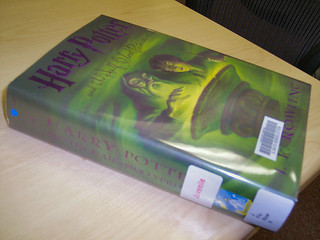Okay, so no, it’s not really a cage match. What it is is a really good interview in Time with Neil Gaiman and Joss Whedon, on the eve of the release of their movies, Mirrormask and Serenity (respectively).
Plenty of good stuff in this interview — I knew I was going to enjoy it right from the start…
TIME: Joss, this is Lev from Time magazine. You’re also in the virtual presence of Neil Gaiman.
Neil Gaiman: I’m not virtual. I’m here.
TIME: Sorry. You’re virtual, Joss. Neil’s real.
Joss Wedon: Okay. I wondered.
TIME: I’m glad we settled that.
Neil on writing, and the drive to avoid repeating yourself:
I saw a lovely analogy recently. Somebody said that writers are like otters. And otters are really hard to train. Dolphins are easy to train. They do a trick, you give them a fish, they do the trick again, you give them a fish. They will keep doing that trick until the end of time. Otters, if they do a trick and you give them a fish, the next time they’ll do a better trick or a different trick because they’d already done that one. And writers tend to be otters. Most of us get pretty bored doing the same trick. We’ve done it, so let’s do something different.
Neil and Joss on their primary fan base:
TIME: Let’s talk about your respective fan bases. A lot of them self-identify as kind of on the geeky side.
NG: I think the fan base is literate. You need to be reasonably bright to get the jokes and to really follow what’s going on. That, by definition, is going to exclude a lot of people who will then get rather irritated at us for being pretentious and silly and putting in things they didn’t quite get. But it’s also going to mean that some of the people who do get the stuff will probably be fairly bright.
JW: Especially, I think, living in any fantasy or science fiction world means really understanding what you’re seeing and reading really densely on a level that a lot of people don’t bother to read. So yes, I think it’s kind of the same thing.
But I also think there’s a bit of misconception with that. Everybody who labels themselves a nerd isn’t some giant person locked in a cubbyhole who’s never seen the opposite sex. Especially with the way the Internet is now, I think that definition is getting a little more diffuse.
On mainstream culture’s growing acceptance of genre work:
TIME: I almost miss the stigma that used to attach to these things. Now everybody’s into Tolkien. And I feel a little like, hey, I’ve been into that stuff my whole life. And in fact, you used to beat me up for it.
JW: I miss a little of that element, the danger of, oh, I’m holding this science fiction magazine that’s got this great cover. There a little bit of something just on the edge that I’m doing this. That’s pretty much gone. Although when I walk into a restaurant with a stack of comic books, I still do get stared at a little bit.
NG: I always loved, most of all with doing comics, the fact that I knew I was in the gutter. I kind of miss that, even these days, whenever people come up and inform me, oh, you do graphic novels. No. I wrote comic books, for heaven’s sake. They’re creepy and I was down in the gutter and you despised me. ‘No, no, we love you! We want to give you awards! You write graphic novels!’ We like it here in the gutter!
JW: We’ve been co-opted by the man.
Neil on “family” films:
…in America, it almost seems like family has become a code word for something that you can put a five-year-old in front of, go out for two hours, and come back secure in the knowledge that your child will not have been exposed to any ideas. I didn’t want to do that. I like the idea of family as something where a seven-year-old would see a film and get stuff out of it, and a fifteen-year-old would get something else out of it, and a 25-year-old would get a different thing out of it.
Joss on his upcoming “Wonder Woman” treatment:
NG: She’s such a character without a definitive story. Or even without a definitive version.
JW: That’s how I feel. I hope to change that because I really feel her. Let’s face it: She’s an Amazon, and she will not be denied.
TIME: I’m really hoping her bustier will slip down a little bit further than it did in the show.
JW: You’re just after a porno, aren’t you?
TIME: Yes.
JW: It’s all about priorities. Yes, it’s very empowering for her to be naked all the time.
(via Pop Astronaut)







